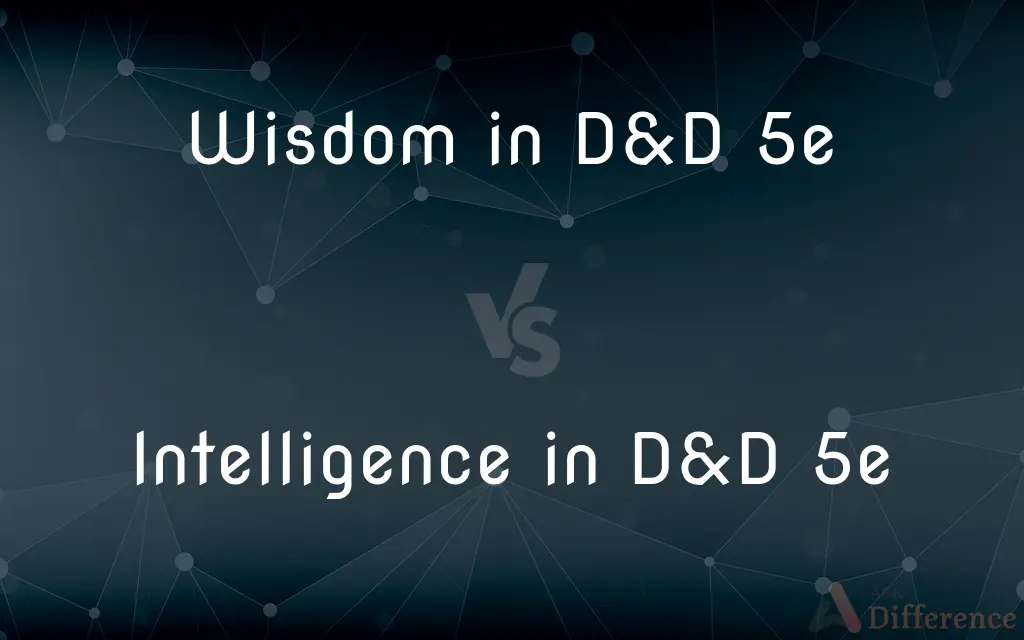Wisdom in D&D 5e vs. Intelligence in D&D 5e — What's the Difference?
Edited by Tayyaba Rehman — By Maham Liaqat — Published on March 2, 2024
In D&D 5e, Wisdom reflects perceptiveness and intuition, influencing insight and survival skills, while Intelligence denotes reasoning and memory, affecting knowledge and language skills.

Difference Between Wisdom in D&D 5e and Intelligence in D&D 5e
Table of Contents
ADVERTISEMENT
Key Differences
In the realm of Dungeons & Dragons 5th Edition (D&D 5e), Wisdom (Wis) and Intelligence (Int) are two core ability scores that distinctly influence a character's capabilities. Wisdom embodies a character's awareness, intuition, and insight, directly impacting abilities related to perception, such as Insight and Survival. It is crucial for classes like Clerics and Druids, for whom intuition and connection with the natural or divine realms are key.
Intelligence, on the other hand, represents a character's memory, reasoning, and analytical skills. It governs abilities that require knowledge and intellect, such as Arcana and History. This ability score is particularly important for Wizards, who rely on their intellectual prowess to learn and cast spells.
Wisdom checks might be used to read a person's true intentions or to navigate through a wild forest, while Intelligence checks are called upon to recall lore about a magical artifact or to decipher an ancient language. This delineation underscores the difference between perceiving the world and understanding its complexities.
Moreover, certain spells and abilities in D&D 5e target Wisdom or Intelligence specifically, reflecting the nature of the challenge they present. For example, a spell that confuses or bewitches might attack a character's Wisdom, testing their willpower and perception, whereas a puzzle or riddle might challenge a character's Intelligence.
The choice between prioritizing Wisdom or Intelligence depends largely on the character's class and role within the party. A balanced party often benefits from having characters with high scores in both areas, ensuring a wide range of skills and abilities to face various challenges.
ADVERTISEMENT
Comparison Chart
Definition
Reflects perceptiveness, intuition, and insight
Represents reasoning, memory, and analytical skills
Key Abilities
Insight, Medicine, Perception, Survival
Arcana, History, Investigation, Nature, Religion
Importance for Classes
Crucial for Clerics, Druids, Rangers
Key for Wizards, Artificers
Skill Checks
Used for understanding people and environments
Used for recalling information and solving puzzles
Spells & Abilities
Affects spells that challenge willpower and perception
Affects spells and challenges that require intellect
Compare with Definitions
Wisdom in D&D 5e
Wisdom measures intuition and perception.
Using Wisdom, the Druid sensed the unnatural silence in the forest.
Intelligence in D&D 5e
It's crucial for Wizards' spellcasting.
The Wizard's Intelligence determined the number of spells he could prepare.
Wisdom in D&D 5e
Wisdom affects Insight and Survival skills.
With keen Wisdom, the Ranger navigated the treacherous terrain effortlessly.
Intelligence in D&D 5e
It can affect the outcome of puzzle-solving.
The Artificer's Intelligence helped the party solve the cryptic puzzle.
Wisdom in D&D 5e
It can influence a character's willpower.
The Paladin's Wisdom helped him resist the siren's enchantment.
Intelligence in D&D 5e
Intelligence denotes reasoning and knowledge.
The Wizard's high Intelligence made him adept at deciphering ancient texts.
Wisdom in D&D 5e
It's vital for spellcasting for Clerics.
The Cleric's high Wisdom improved the effectiveness of her healing spells.
Intelligence in D&D 5e
Intelligence governs skills like Arcana and History.
The Rogue used her Intelligence to recall the trap's arcane mechanism.
Wisdom in D&D 5e
Wisdom checks can read emotions or situations.
The Monk's Wisdom allowed her to detect the lie in the thief's apology.
Intelligence in D&D 5e
Intelligence checks can recall information.
The Bard's Intelligence allowed him to recount the legend accurately.
Common Curiosities
How do DMs decide when to use Wisdom vs. Intelligence checks?
DMs base this on the action's nature: Wisdom for intuition and perception-related tasks, and Intelligence for analytical and knowledge-based challenges.
Can a character be high in both Wisdom and Intelligence?
Yes, a character can have high scores in both, making them perceptive and knowledgeable, though this may come at the cost of other abilities.
How do Wisdom and Intelligence impact a character's interaction with the game world?
Wisdom enhances a character's ability to perceive the world, while Intelligence enriches their understanding and interaction with its elements.
How important is it to have a balanced party in terms of Wisdom and Intelligence?
A balanced party can handle a wider range of challenges, making both Wisdom and Intelligence valuable in different situations.
Can a low score in Wisdom or Intelligence be compensated for in D&D 5e?
While challenging, creative strategies and teamwork can help mitigate the drawbacks of low scores in these areas.
Are Wisdom and Intelligence equally important for all D&D 5e campaigns?
The importance can vary depending on the campaign's focus; some may emphasize social interaction and exploration (Wisdom), while others focus on puzzles and lore (Intelligence).
Are there any races in D&D 5e that naturally have higher Wisdom or Intelligence?
Yes, certain races, like Elves (Intelligence) and Wood Elves (Wisdom), receive bonuses to these scores.
How do Wisdom and Intelligence affect combat in D&D 5e?
They can indirectly affect combat through skill checks, saving throws, and the effectiveness of certain spells.
Can items or spells in D&D 5e increase a character's Wisdom or Intelligence?
Yes, various magical items and spells can temporarily or permanently enhance these ability scores.
Can a spellcaster use both Wisdom and Intelligence?
Yes, some spellcasters might rely on both, but usually, one is primary for spellcasting abilities, depending on the class.
Do Wisdom and Intelligence affect saving throws?
Yes, both can affect saving throws, protecting against mental attacks and manipulations.
Do Wisdom and Intelligence play a role in character development?
Yes, they can shape a character's personality, background, and approach to problem-solving.
How does a character's class choice affect the importance of Wisdom or Intelligence?
Certain classes, like Clerics and Wizards, rely heavily on one of these scores for their core abilities and spellcasting.
How do environmental and situational factors in D&D 5e affect Wisdom and Intelligence checks?
Conditions like darkness or silence might affect Wisdom (Perception) checks, while time pressure or distractions might impact Intelligence-based tasks.
Can a character improve their Wisdom or Intelligence over time in D&D 5e?
Yes, through leveling up and choosing certain feats, a character can increase these ability scores, reflecting growth and experience.
Share Your Discovery

Previous Comparison
Cinnamon Bun vs. Cinnamon Roll
Next Comparison
Big Data vs. Small DataAuthor Spotlight
Written by
Maham LiaqatEdited by
Tayyaba RehmanTayyaba Rehman is a distinguished writer, currently serving as a primary contributor to askdifference.com. As a researcher in semantics and etymology, Tayyaba's passion for the complexity of languages and their distinctions has found a perfect home on the platform. Tayyaba delves into the intricacies of language, distinguishing between commonly confused words and phrases, thereby providing clarity for readers worldwide.
















































